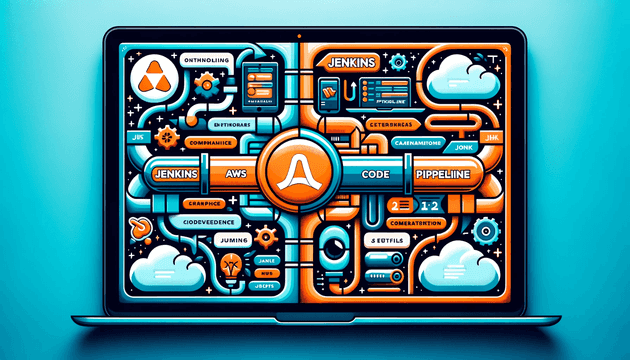Yesterday, I was doing some research on pipeline setup. Continuous integration and continuous delivery (CI/CD) are two important practices in software development that help teams automate the building, testing, and deployment of their code. There are a number of different CI/CD tools available, two of the most popular are Jenkins and AWS CodePipeline.
Jenkins is an open-source CI/CD tool that has been around for over a decade. It is known for its flexibility and extensibility, with over 1,800 plugins available to add new features and integrations. Jenkins can be deployed on-premises or in the cloud, and it can be used to build and deploy applications to a wide range of platforms.
AWS CodePipeline is a fully managed CI/CD service from Amazon Web Services (AWS). It is designed to be easy to use and scalable, and it integrates seamlessly with other AWS services such as CodeBuild, CodeDeploy, and Elastic Container Service (ECS).
Here is a comparison of Jenkins and AWS CodePipeline:
| Feature | Jenkins | AWS CodePipeline |
|---|---|---|
| Deployment: | Can be deployed on-premises or in the cloud | Fully managed cloud service |
| Pricing: | Open source and free to use | Pay-as-you-go pricing |
| Flexibility: | Highly flexible and extensible with over 1,800 plugins available | Less flexible than Jenkins, but still offers a wide range of features |
| Ease of use: | Can be complex to set up and configure, especially for first-time users | Easier to use than Jenkins, especially for users with limited CI/CD experience |
| Integrations: | Integrates with a wide range of third-party tools and services | Integrates seamlessly with other AWS services |
Which one is right for you?
The best CI/CD tool for you will depend on your specific needs and requirements. If you are looking for a highly flexible and extensible tool, Jenkins is a good option. However, if you are looking for a fully managed CI/CD service that is easy to use and integrates seamlessly with other AWS services, AWS CodePipeline is a good choice.
Here are some additional factors to consider when choosing between Jenkins and AWS CodePipeline:
- Team size and experience: If you have a small team with limited CI/CD experience, AWS CodePipeline may be a better choice because it is easier to use and set up. If you have a larger team with more CI/CD experience, Jenkins may be a better choice because it offers more flexibility and control.
- Existing infrastructure: If you already have a lot of existing infrastructure on-premises, Jenkins may be a better choice because it can be deployed on-premises. If you are already using AWS for your cloud infrastructure, AWS CodePipeline may be a better choice because it integrates seamlessly with other AWS services.
- Budget: Jenkins is open source and free to use, while AWS CodePipeline is a pay-as-you-go service. If you are on a tight budget, Jenkins may be a better choice. However, if you are willing to pay for a fully managed CI/CD service, AWS CodePipeline may be a better choice.
Conclusion
Both Jenkins and AWS CodePipeline are powerful CI/CD tools. The best choice for you will depend on your specific needs and requirements. Consider the factors listed above when making your decision.
